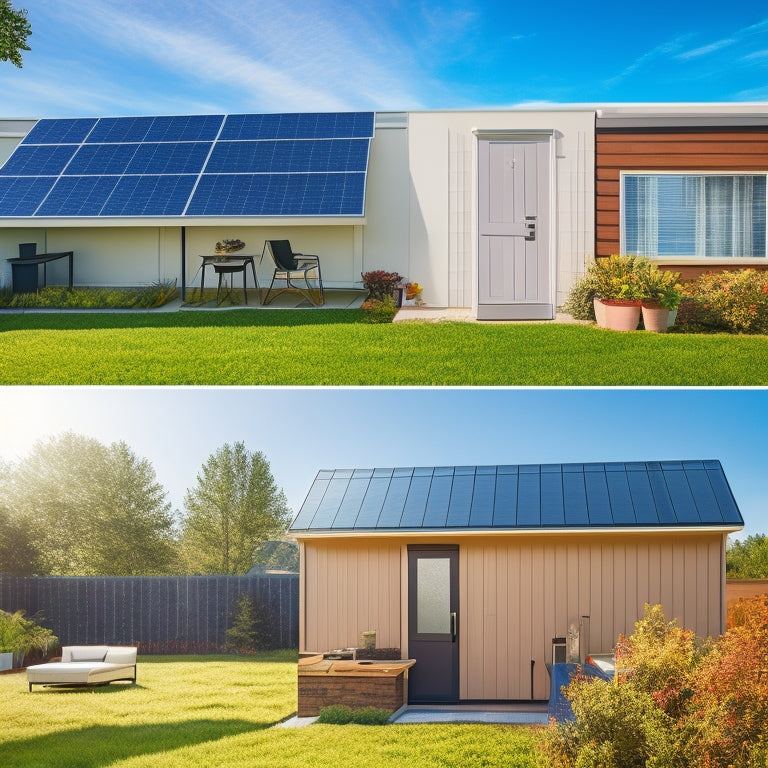
Solar With Battery Storage Cost
Share
When investing in solar with battery storage, you're likely wondering about the upfront cost. The good news is that this system allows you to store excess energy generated during the day for use after sunset, reducing grid reliance and energy bills. High-quality batteries and advanced monitoring systems provide real-time energy tracking and control. Plus, solar battery storage can greatly increase property worth, making it an important long-term investment. While costs vary depending on system size and components, understanding the benefits and system requirements will help you make an informed decision - and getting the details right can have a considerable impact on your energy independence and savings.
The Essentials
- Solar battery storage costs vary depending on battery type, capacity, and inverter compatibility, with prices ranging from $5,000 to $15,000 or more.
- High-quality batteries reduce reliance on the grid, control energy costs, and provide protection from grid outages and fluctuations, making them a worthwhile investment.
- Energy independence at night and power through the night are key benefits of solar battery storage, enhancing freedom and flexibility of energy usage.
- Installation of solar battery storage can significantly increase property value, with studies indicating that solar panels can increase property value by up to $15,000.
- Financial incentives and rebates may offset installation costs, making solar battery storage a more affordable and economically viable option.
Energy Independence at Night
You can power through the night without relying on the grid, thanks to solar battery storage.
This means you'll have energy after sunset, even when the sun isn't shining. By storing excess energy generated during the day, you'll have a reliable source of power when you need it most.
With a high-quality house solar battery, like Renewable Energy, you can optimize your energy consumption and reduce your reliance on the grid, giving you greater control over your energy costs and a more sustainable living experience.
Power Through the Night
A darkened house, once reliant on the grid, now hums with energy independence thanks to solar battery storage. You've achieved the freedom to power through the night, unshackled from the constraints of traditional energy providers.
Your solar integration system utilizes the sun's energy during the day, storing excess power in Deep Cycle Batteries for nighttime energy use, allowing you to maximize your solar power and reduce energy waste. With this system, you'll also gain protection from grid outages and fluctuations that can leave you in the dark.
As the sun sets, your stored energy kicks in, providing a seamless shift to nighttime energy independence. This means you can power your home's essential systems, like refrigeration and lighting, without reliance on the grid.
You're no longer at the mercy of utility companies, subject to their rate hikes and outages.
With solar battery storage, you're in control. You decide when and how you use your energy, enjoying the peace of mind that comes with true energy independence.
And with advanced monitoring systems, you can track your energy production and consumption in real-time, making data-driven decisions to optimize your setup.
Energy After Sunset
As the sun dips below the horizon, solar battery storage takes center stage, guaranteeing a reliable flow of energy to your home even after dark. This is where energy independence at night becomes a reality, thanks to advancements in solar efficiency and battery technology.
With a well-designed solar battery storage system, you can utilize the power generated during the day and store it for use during the night, reducing your reliance on the grid. Furthermore, with a reliable Solar Energy Storage solution, users can alleviate the burden of high energy bills and reduce grid dependence, providing them with greater energy independence and potential cost savings sustainable energy solutions.
When the sun sets, your solar panels stop generating electricity, but your battery storage system kicks in, providing a seamless shift to stored energy. This means you can continue to power your home, run your appliances, and keep your lights on without worrying about the grid's limitations.
The battery technology guarantees a stable and efficient flow of energy, allowing you to enjoy the freedom and flexibility that comes with being energy-independent.
Increased Property Value Boost
You're likely to see a significant increase in your property's value when you install a solar battery storage system.
As homeowners opt for residential solar panel prices, they're not only reducing their electricity bills but also contributing to a higher resale value.
This enhancement is attributed to two key factors: property value boosters and higher sale prices.
Property Value Boosters
While investing in solar battery storage may seem like a costly upfront expenditure, it yields a significant return through increased property value.
You'll find that solar-powered homes with battery storage appeal more to potential buyers, increasing your property's appeal and market demand. As a homeowner, you'll benefit from the added value, which can lead to a higher resale price.
This increased appeal is largely due to the energy independence and cost savings that solar battery storage provides. Homebuyers are willing to pay a premium for properties with sustainable energy solutions, making your property more attractive in a competitive market.
Furthermore, solar battery storage installations can also enhance your property's aesthetic appeal, as modern systems are designed to be sleek and unobtrusive.
Higher Sale Prices
Enhance your sale price with solar battery storage, as studies have consistently shown that properties equipped with these systems command higher prices on the market. You can reap the benefits of this increased value when you decide to sell your property.
In fact, a study by the National Renewable Energy Laboratory found that solar panels can increase your property value by up to $15,000. With the added benefit of battery storage, you can expect an even higher sale price.
You'll be taking advantage of market trends that favor environmentally friendly and energy-efficient properties. According to a survey by the National Association of Realtors, 80% of homebuyers consider energy efficiency an important factor when purchasing a home.
By installing solar battery storage, you'll not only increase your property value but also appeal to a wider range of potential buyers.
Additionally, you may be eligible for financial incentives, such as tax credits or rebates, which can further offset the cost of your solar battery storage system.
Deep Cycle Battery Life
You're likely wondering how long your deep cycle batteries will last, and what factors affect their lifespan.
With a high-performance solar battery system, you can maximize renewable energy storage and reduce reliance on the grid solar power system battery.
When it comes to battery lifespan expectations, you should consider the number of charge cycles, as well as the depth of each cycle, which can impact the battery's overall health and aging.
Battery Lifespan Expectations
When it comes to investing in solar battery storage, understanding the lifespan of deep cycle batteries is vital. You're not just buying a battery; you're making a long-term investment in your energy independence. As you consider your options, it's important to know what to expect from your battery's lifespan.
Typically, deep cycle batteries can last anywhere from 5 to 15 years, depending on various factors such as usage patterns, charging cycles, and environmental conditions. Proper battery maintenance plays a significant role in extending the lifespan of your battery. Regular checks on voltage, temperature, and electrolyte levels can help identify potential issues before they become major problems.
Additionally, avoiding deep discharges and keeping your battery within the recommended state of charge (SOC) can also contribute to a longer lifespan.
Replacement costs are an important consideration when evaluating the overall cost of solar battery storage. By understanding the expected lifespan of your battery, you can better plan for future replacement costs and budget accordingly.
With proper care and maintenance, your deep cycle battery can provide you with years of reliable energy storage, giving you the freedom to enjoy your independence from the grid.
Cycle Depth and Aging
Five to seven years into their lifespan, deep cycle batteries typically start to exhibit signs of aging, largely due to the concept of cycle depth.
You're probably wondering what this means. Cycle depth refers to the percentage of the battery's capacity that's used during each discharge cycle. For instance, if you use 50% of your battery's capacity daily, it'll have a deeper cycle depth than if you only used 20%.
Deeper cycle depths lead to faster aging, reducing the battery's overall lifespan.
To maximize your deep cycle battery's life, it's important to understand cycle life factors. These include the number of charge/discharge cycles, temperature, and maintenance practices.
Proper battery maintenance tips, such as keeping the battery cool, avoiding overcharging, and ensuring proper ventilation, can greatly extend its lifespan.
Check Inverter Compatibility First
When selecting a solar battery storage system, you need to verify the inverter is compatible with your chosen battery brand.
Residential solar energy storage systems, such as those featuring photovoltaic panels and energy storage units, rely on compatible inverters for efficient energy production and storage.
You'll want to research inverter brand options, such as SMA or Fronius, to determine which ones support your desired battery type grid tie inverters.
It's essential to perform battery compatibility checks to avoid potential system integration issues down the line.
Inverter Brand Options
Your solar battery storage system's performance hinges on the inverter, a vital component that converts DC power from your solar panels and battery into usable AC electricity for your home. With various inverter types available, selecting the right brand is essential. You'll want to take into account factors like inverter efficiency, compatibility, and warranty when making your decision.
Here is a comparison of some popular inverter brands:
| Brand | Inverter Efficiency | Warranty (Years) |
|---|---|---|
| Enphase | 96.5% - 97.5% | 10-25 |
| Schneider Electric | 95% - 97% | 10-25 |
| SMA Solar Technology | 94% - 96% | 10-20 |
| Tesla | 95% - 97% | 10-25 |
| Fronius | 94% - 96% | 5-15 |
When choosing an inverter brand, reflect on your specific needs and requirements. Research each brand's inverter types, efficiency ratings, and warranty options to confirm you're getting the best fit for your solar battery storage system.
Battery Compatibility Checks
As you've selected an inverter that meets your performance and warranty requirements, it's vital to verify compatibility with your solar battery storage system. This involves checking the inverter's compatibility with different battery types, such as lead-acid, lithium-ion, or sodium-ion batteries. Each battery type has unique characteristics, and the inverter must be able to communicate and operate seamlessly with the chosen battery.
Compatibility testing is essential to confirm the inverter can enhance battery charging and discharging, monitor battery state of charge, and provide accurate energy metering. You should consult the inverter manufacturer's documentation to determine compatible battery models and configurations. Some inverters may require specific settings or firmware updates to work with certain battery types.
Performing thorough compatibility testing will help prevent system malfunctions, reduce the risk of battery damage, and guarantee peak system performance.
Lower Grid Dependence Rate
You'll find that reducing your grid dependence rate with solar battery storage can greatly lower your energy bills.
By storing excess energy generated during the day for use during peak hours or at night, you'll reduce your reliance on the grid and decrease your energy expenses.
As a result, you'll enjoy reduced energy bills and a more stable energy budget.
Reduced Energy Bills
Implementing solar battery storage greatly slashes your energy bills by reducing your reliance on the grid. This decrease in grid dependence translates to significant energy savings, which can be substantial over time.
When you generate your own power and store excess energy, you're less likely to draw from the grid during peak hours, resulting in lower energy bills.
By investing in solar battery storage, you can enjoy a cost comparison that favors your wallet. With reduced energy consumption from the grid, your utility bills will decrease, and you'll experience a tangible return on investment.
Furthermore, you'll have more control over your energy usage, allowing you to make informed decisions about your energy needs.
With solar battery storage, you can optimize your energy consumption and reduce your reliance on the grid. This not only leads to lower energy bills but also contributes to a more sustainable future.
Frequently Asked Questions
How Long Does a Solar Battery Storage System Typically Last?
You'll find that a typical solar battery storage system lasts around 10-15 years, with its lifetime expectancy affected by performance degradation, which is influenced by factors like usage patterns, temperature, and maintenance quality.
Can I Use Any Type of Battery With My Solar Panel System?
While freedom from grid constraints beckons, you can't just pair any battery with your solar panel system; ensuring battery compatibility is essential to maintain ideal solar efficiency, so you'll need to choose a compatible battery that harmonizes with your system's unique requirements.
Are Solar Batteries Prone to Overheating or Fires?
You're right to contemplate battery safety; overheating risks are real, but you can mitigate them by choosing high-quality batteries with built-in thermal management, monitoring systems, and proper installation, ensuring your freedom to utilize renewable energy with peace of mind.
Can I Charge My Electric Vehicle With Solar Battery Storage?
As you travel the open road, imagine utilizing the sun's energy to fuel your expedition. Yes, you can charge your electric vehicle with solar battery storage, using solar charging systems that sync seamlessly with your EV's power needs.
Do Solar Batteries Require Regular Maintenance or Replacement?
You'll need to perform routine maintenance checks on your solar battery every 3-6 months to guarantee peak performance, and expect to replace them every 10-15 years, depending on the battery lifespan and maintenance frequency.
Final Thoughts
As you utilize the power of solar with battery storage, you're not just cutting energy costs, you're revealing a wealth of benefits. You'll bask in the freedom of energy independence at night, watch your property value skyrocket, and enjoy the long-lasting reliability of deep cycle batteries. By checking inverter compatibility first, you'll guarantee a seamless integration. And with each passing day, you'll find yourself drifting further away from the grid, like a sailboat gliding into open waters, leaving behind a trail of lower dependence rates.
Related Posts
-

Is Switching to Green Energy Solutions Easy
Switching to green energy solutions isn't just easy; it's also beneficial. You can greatly cut utility costs and enjo...
-

Why Outdoor Solar Lighting Systems Are Sustainable
Outdoor solar lighting systems are sustainable because they utilize renewable energy, drastically reducing your carbo...
-

High-Efficiency Solar Battery Chargers for Remote Areas
High-efficiency solar battery chargers are essential for your off-grid energy needs in remote areas. They maximize en...


